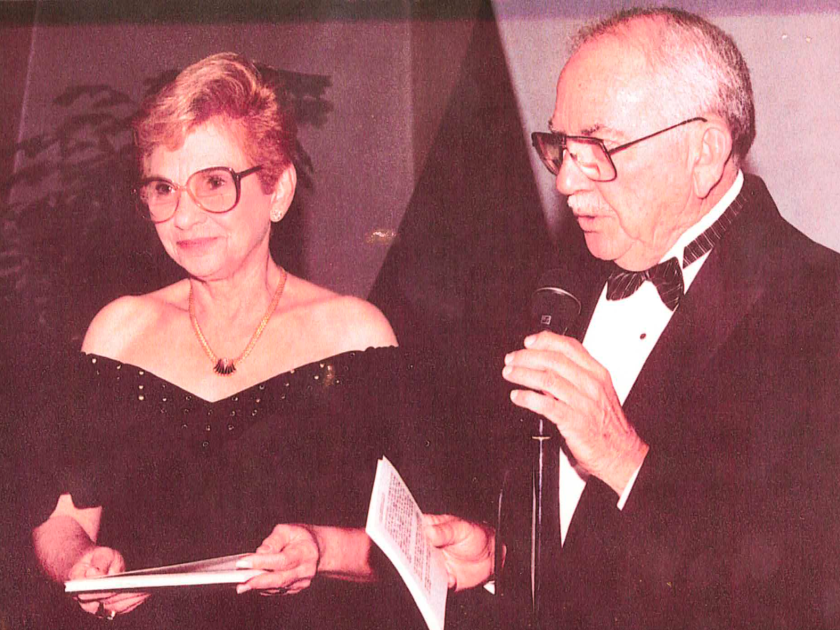
Author’s grandparents, photo courtesy of the author
The first musical I ever saw was Joseph and the Amazing Technicolor Dreamcoat. I was probably around eight years old, and I was transfixed from start to finish. The harmonies, the costumes (that coat!), the choreography, the acting — it all solidified for me that any story worth telling can be told even better when there’s a song behind it.
My parents deserve most of the credit for my love of musicals. I grew up listening to a stack of original cast recordings on a set of cassette tapes that they rotated whenever we were in the car. Every Sunday, as we drove to North Miami Beach to have dinner with my grandparents, I was inducted into the mythical morality of Camelot, the family drama behind Tap Dance Kid, and the dark side of fame in Dreamgirls.
While my mom and dad certainly fostered my deep and undying love for an eleven o’clock number (the show-stopping second act number), it was my grandparents, Izzy and Evie Abrams, who first inspired this passion. My mom grew up on a steady diet of Funny Girl and Rodgers and Hammerstein, but my dad, a Cuban immigrant, didn’t know his Carousel from his Cinderella before my grandparents took them to see the Neil Simon classic They’re Playing Our Song, the beginning of a lifetime of admiration for the genre.
My grandfather was a lawyer and a judge by trade, but his true love was performing, especially jokes set to music. One year, he even tried his hand at writing an off (off- off- off-) Broadway show — Temple Beth Torah’s production of Isn’t Everybody? This original musical followed a group of monkey astronauts sent on a mission to Mars who discover upon landing that the planet is already populated and everyone there is Jewish. It’s a great loss to the annals of musical theater that it never crossed over to the mainstream.
The world of musicals was magical to me, even though I was never brave enough to follow in my grandparents’ performing footsteps.
My grandmother Evie was the sensible one, but she too got swept up in my grandfather’s musical fervor. (It’s true, you can’t stop the beat). As a pair, they were in high demand, performing at weddings, anniversaries, and — their specialty — the bar and bat mitzvahs of family and friends up and down the Florida coast. Their candle lighting ceremonies were epic, as they tweaked the lyrics of popular songs to reflect the honor, humor, and deep affection the occasion required. After my grandmother died, in 2000, Izzy continued performing, calling himself “a sit down comedian” (“because I’m too old to stand up for too long”). Every Passover he produced a new ditty, still setting his jokes to music. At my wedding, he requested a twenty-minute set (we gave him five).
The world of musicals was magical to me, even though I was never brave enough to follow in my grandparents’ performing footsteps. But in 2019, on the cusp of turning forty, I decided on the format of my (pre) mid-life crisis: I would leave my job as CEO of a philanthropy consulting firm and try my hand at unpaid internships in all the jobs I had ever dreamed of doing. The first stop on my tour of “what ifs” would have to be the Great White Way.
I had two opportunities to shadow and support shows in New York that were about to open – an off-Broadway production of Assassins at the Classic Stage Company, and Flying Over Sunset, a new Broadway musical set to launch at Lincoln Center. In between filling water jugs for the cast, getting coffees and filing receipts in the production office, I got to watch as these experts in their respective crafts – people like John Doyle, James Lapine, Tom Kitt, and Michael Korie – directed, wrote, and re-wrote songs and pulled together, in the way that only a musical can, that perfect marriage of music and lyric to tell a story in the most soul-filling way possible. Because what my grandparents always knew – and I found out – is that what musicals really do is allow us to share pieces of our lives, our culture, our history, and our feelings to get at the root of who we really are. Sometimes with tap dancing. For me, there is truly nothing better. At the end of my first internship day, I texted my husband: “Today was amazing. If this was it, and I had to come home tomorrow, it would have all been worth it.”
The story of what happened next – the shutting down of Broadway due to the pandemic, three other internships in wildly different professions, and the changing of my entire life – can now be found in my recent memoir, My What If Year. And while my book only features a few choice mentions of my wonderful grandparents, I think about my grandparents every time I hear a song that makes me laugh or cry, and particularly when I’m writing jokes. Their voices in my head – always set to music – are what keep me wanting to tell my stories.
Alisha Fernandez Miranda is the author of My What If Year, featured on Good Morning America, CNN, MSNBC, NPR, and as one of People’s Best Books, and the forthcoming novel Someone’s Gotta Give. She serves as Chair and former CEO of I.G. Advisors, a social impact intelligence agency that consults with the world’s biggest nonprofits, foundations, and corporations on their philanthropy and social initiatives. A graduate of Harvard University and the London School of Economics, her writing has appeared in Vogue, Marie Claire, Romper and elsewhere.